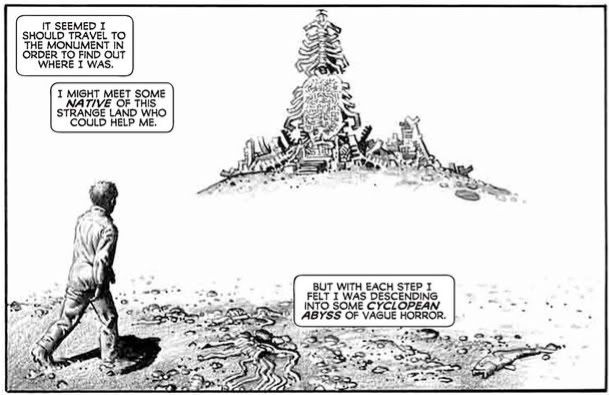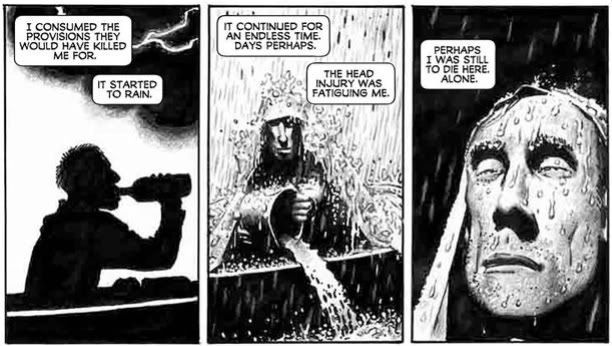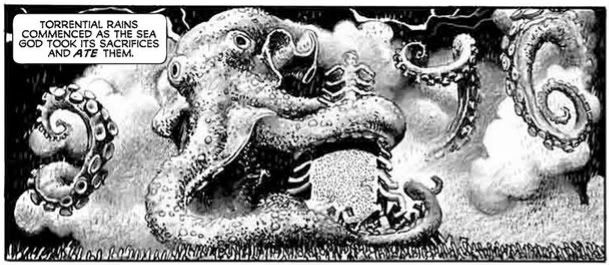Those Old-Time Haunts: Jog on the vast, Polyphemus-like and loathsome of 6/4
/![]() Haunt of Horror: Lovecraft #1 (of 3):
Haunt of Horror: Lovecraft #1 (of 3):

Back in 2006, Marvel put out a three-issue miniseries titled Haunt of Horror: Edgar Allan Poe. It was an odd project for the publisher, reviving the brand of a mid-'70s line of digests and magazines as a literary adaptation showcase for veteran artist Richard Corben. It was all in b&w, perhaps to better evoke the feel of old horror magazines; certainly the stories hearkened back to the short shockers through which some memorable stylists thrived, not least among them Corben himself (though he did much color work at the time too).
Yet each tale was also helpfully followed by its prose or verse original, loose as the adaptation might have been - it certainly made for easier comparison, and maybe a touch of added literary heft. I recall the pamphlet release being timed out so that a hardcover collection could be on bookstore shelves in time for Halloween; I guess that plan worked, since here's the sequel, with what looks to be the same release pattern.
I'm pretty glad. Corben has certainly done some rewarding work in the confines of preexisting series -- I really liked his art on The Punisher: The End and Hellboy: Makoma, or, A Tale Told by a Mummy in the New York City Explorers' Club on August 16, 1993, and especially Vertigo's first American Splendor series -- but he seemed most at ease with the Poe material, and the various short stories from his issue of DC's lamented Solo (#2).
Granted, this new series -- 25 pages of comics this issue, with 7 pages of text, no ads, $3.99 -- marks something of a departure from even those two, in that Corben is now doing all the writing by himself too (with Jeff Eckleberry on letters), adapting the story Dagon and two selections from The Fungi from Yuggoth (Recognition and A Memory). I suspect that it's Corben's visuals that'll continue to attract the most attention.

This isn't quite the best work of Corben's I've seen of late. Which means there's still some great bits - the partial coloring on the front and back covers is nicely striking, the big monster close-ups land with some impact, and there's a fine, rather understated sequence with a man catching fire while atop a horse that I really liked. Those Corben facial expressions always raise a smile too.
But several pages seem less atmospheric than sparse - the artist's conversion of the inky marsh of Lovecraft's Dagon to a beach of white mist and matching overcast skies seems less "the unutterable hideousness that can dwell in absolute silence and barren immensity" than a matter of convenience, particularly when the text is right there to establish the choking intoxication that rises with Lovecraft's oceanic rot, something you'd expect Corben's pulsing style to tackle with glee. Yet there's more restraint than expected in here, replacing Lovecraft's emphasis on place with vivid focusing events -- creatures dancing, monsters looming -- that draw Corben's art out into more gnarled detail.
Indeed, Corben's Dagon adaptation generally seems caught between preserving Lovecraft's hallucinogenic account of ancient creatures seething below humankind's warmaking and providing a more action-focused comic experience, filled with human sacrifice and undulating hordes. Lovecraft miscellany of a sort, though I'm no expert as to where Corben might be drawing from. His emphasis on events is strong enough that his narrator seems far more beleaguered than Lovecraft's humored morphine addict, which makes the adaptation's concluding nod to suicide-by-vision (love the hand barely creeping in from off-panel) seem inauthentic.

Yet, just as with the Poe project, Corben is better with less detailed source material. Recognition makes for an easy transformation into just the type of fevered morality play that a magazine like Haunt of Horror might specialize in, even as the groaning faces of Corben's trees gradually give way to a fight in gray & white murk. And A Memory benefits from a full transformation into a swords 'n witchery saga of good old atavistic guilt, shock ending definitely included!
A curious series, even on the second go-around, and certainly not for every Marvel reader. Or every Lovecraft reader, I bet. It's mainly for Richard Corben admirers, and/or those happy to relive the twisting pace of older, shorter horror comics, and the ways they might absorb even earlier horrors into their being. As luck would have it, that accounts for me, so I'll call it GOOD.











